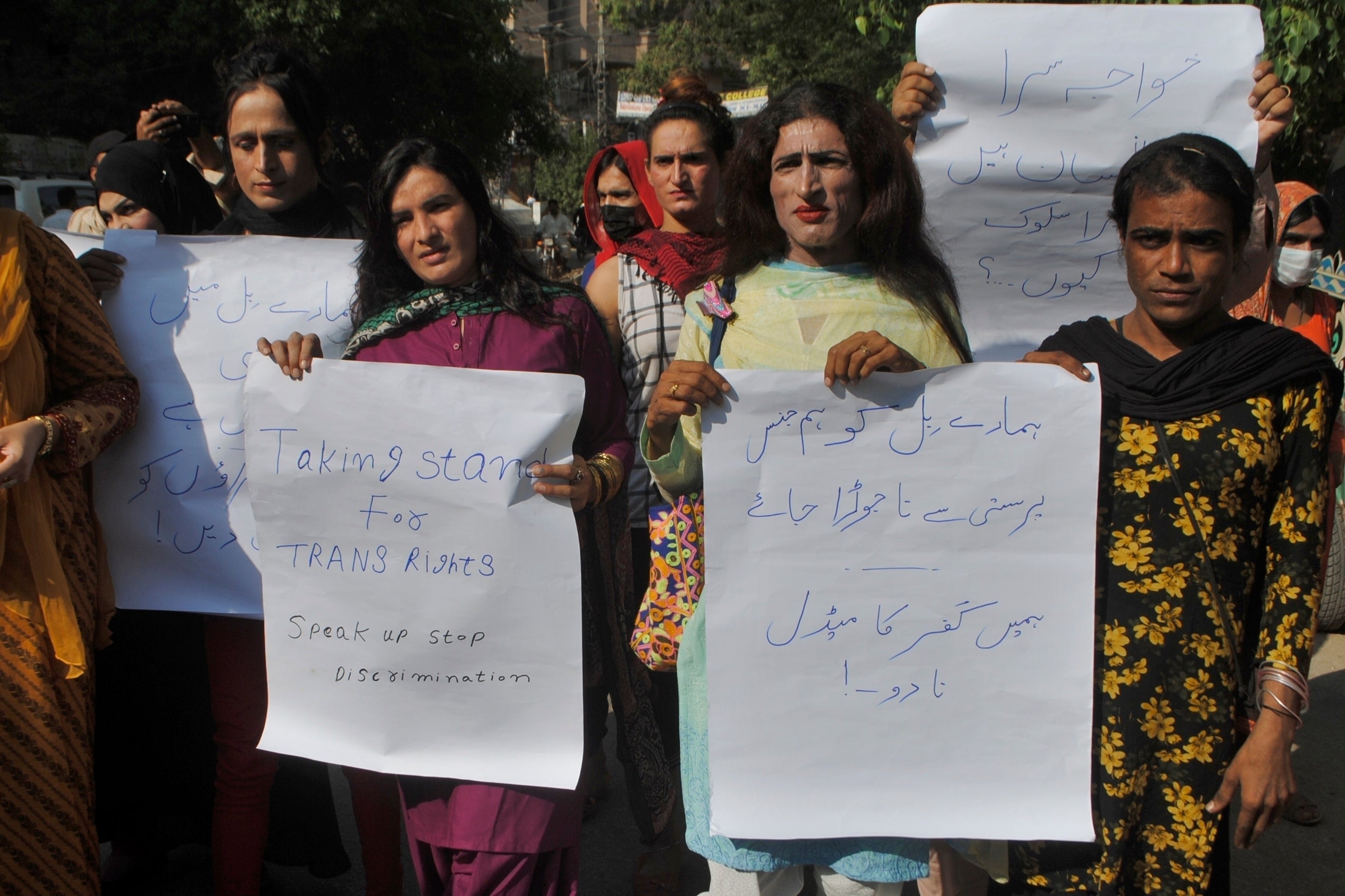Pakistani transgender activists to appeal Shariah court ruling against law aimed at protecting them
Transgender activists in Pakistan say they plan to appeal an Islamic court’s ruling that guts a law aimed at protecting their rights

Your support helps us to tell the story
From reproductive rights to climate change to Big Tech, The Independent is on the ground when the story is developing. Whether it's investigating the financials of Elon Musk's pro-Trump PAC or producing our latest documentary, 'The A Word', which shines a light on the American women fighting for reproductive rights, we know how important it is to parse out the facts from the messaging.
At such a critical moment in US history, we need reporters on the ground. Your donation allows us to keep sending journalists to speak to both sides of the story.
The Independent is trusted by Americans across the entire political spectrum. And unlike many other quality news outlets, we choose not to lock Americans out of our reporting and analysis with paywalls. We believe quality journalism should be available to everyone, paid for by those who can afford it.
Your support makes all the difference.Transgender activists in Pakistan said they plan to appeal to the highest court in the land an Islamic court's ruling that guts a law aimed at protecting their rights.
The Transgender Persons (Protection of Rights) Act was passed by Parliament in 2018 to secure the fundamental rights of transgender Pakistanis. It ensures their access to legal gender recognition, among other rights.
Many Pakistanis have entrenched beliefs on gender and sexuality and transgender people are often considered outcasts. Some are forced into begging, dancing and even prostitution to earn money. They also live in fear of attacks.
The Federal Shariat Court on Friday struck down several provisions of the landmark law, terming them “un-Islamic.”
It ruled that a person cannot change their gender on the basis of “innermost feeling” or “self-perceived identity” and must conform to the biological sex assigned to them at the time of birth.
The Shariah court has the constitutional mandate of examining and determining whether laws passed by Pakistan's parliament comply with Islamic doctrine.
“We absolutely intend to appeal the court’s findings to the Supreme Court, and we will prevail,” said Nayyab Ali, executive director of Transgender Rights Consultants Pakistan, at a news conference Friday.
Ali said the transgender community was “mourning the decimation" of Pakistan’s first transgender rights protection legislation in response to the Islamic court's finding.
However, clerics and representatives from religious parties say the law has the potential to promote homosexuality in this conservative country with a Muslim majority. They want the Islamic court to annul the law.
The Shariah court ruled that the term “transgender” as it is used in the law creates confusion. It covers several biological variations, including intersex, transgender men, transgender women and Khawaja Sira, a Pakistani term commonly used for those who were born male but identify as female.
It also rejected a clause in the law in which the country’s national database and registration authority permits the change of a person’s biological gender from the one they were assigned at birth in identification documents including drivers licenses and passports.
It said permitting any person to change their gender in accordance with his or her inner feeling or self-perceived identity will create “serious religious, legal and social problems.”
For example it will allow a transgender woman — a person who is biologically male — to access social and religious gatherings of females or women-only public places, and vice versa, it said.
“This law will pave the way for criminals in society to easily commit crimes like sexual molestation, sexual assault and even rape against females in the disguise of a transgender woman,” the court ruled.
However, the court said Islamic law recognizes the existence of intersex people and eunuchs and said they should be entitled to all the fundamental rights provided to Pakistanis in the constitution.
The Human Rights Commission of Pakistan expressed dismay over the “regressive ruling” and said the denial of transgender people's rights to self-perceived gender identity seeks the “erasure of an entire demographic and its fundamental rights.” It said rolling back the transgender bill will lead to further marginalization and abuse of an already vulnerable community in Pakistan.
Amnesty International called on the government to stop any attempts to prevent transgender people from obtaining official documents reflecting their gender identity without complying with abusive and invasive requirements.
“This verdict is a blow to the rights of the already beleaguered group of transgender and gender-diverse people in Pakistan,” said Rehab Mahamoor, research assistant at Amnesty International, in a statement.
She said any steps to deny transgender and gender-diverse people the right to determine their own gender identity would violate international human rights law.
Subscribe to Independent Premium to bookmark this article
Want to bookmark your favourite articles and stories to read or reference later? Start your Independent Premium subscription today.